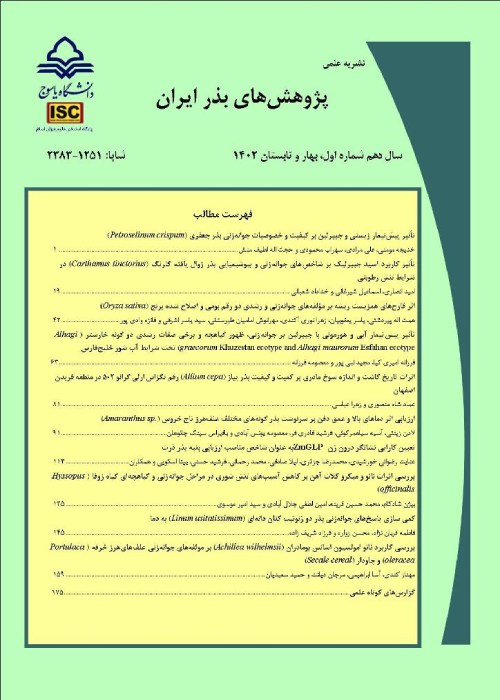Effects of Plant Growth-Promoting Rhizobacteria on Germination and Early Growth of Alfalfa (Medicago sativa) under Salt Stress Conditions
Salinity is one of the most serious abiotic stresses, causing instability in germination and seed emergence due to low osmotic potential and ionic toxicity. Development of simple and low-cost biologic methods is essential for short-term management of salt stress. The use of plant growth-promoting rhizobacteria increases the rate and uniformity of germination. This research aimed to investigate the effect of bacterial growth-promoting bacteria on the germination and seedling growth indices of alfalfa c.v. Hamedani in different salinity levels.
A CRD factorial experiment with four replications was conducted in Seed Science and Technology Laboratory of Shahrekord University in 2016. The first factor consisted of 6 salinity levels 0, 2.5, 5, 7.5, 10 and 12.5 dS/m created with sodium chloride, and the second was four levels of bacterial pre-treatment: no inoculation with bacteria and biopriming, inoculation of alfalfa seeds with Acinetrobacter calcoaceticus PTCC 1318, Bacillus megaterium PTCC 1250 and Enterobacter aerogenes PTCC 1221. The seeds were treated with bacteria and placed at a 20 °C growth chamber. They were then irrigated with desired solutions depending on the salinity treatment. Germinated seeds were counted daily and the parameters of germination percentage and rate, seedling length, seedling dry weight, vigour index I, II and allometric coefficient were calculated after 10 days.
Salinity levels higher than 10 dS/m reduced germination indices and seedling growth of alfalfa. The highest reductions were obtained for 12.5 ds/m salinity level versus control for germination percentage (10.81%), germination rate (49.48%), plumule and radicle length (13.30% and 28.88% respectively) and vigor index I and II, which were 30.27% and 6.28%, respectively. The seed treated with A. calcoaceticus was able to tolerate salinity stresses more than others. For example, the reduction for the seed treated with A. calcoaceticus was only 4%, compared with non-stressed control. In salinity conditions 2.5 and 5 dS/m, the highest rate of germination was obtained, using A. calcoaceticus bacteria. In addition, the seeds treated with E. aerogenes showed higher stability at different levels of salinity for seedling length traits. The highest vigour index related to the use of A. calcoaceticus in salinity was 7.5 ds/m.
A. calcoaceticus had a significant role in reducing the negative effects of salinity on germination percentage and rate, vigour index I and II and allometric coefficient while E. aerogenes bacteria were more effective in reducing negative effects of salinity on seedling length and dry weight.
- حق عضویت دریافتی صرف حمایت از نشریات عضو و نگهداری، تکمیل و توسعه مگیران میشود.
- پرداخت حق اشتراک و دانلود مقالات اجازه بازنشر آن در سایر رسانههای چاپی و دیجیتال را به کاربر نمیدهد.


